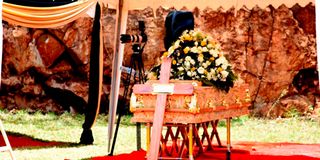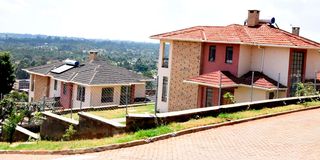Premium
Tragic end for budding real estate investor who dared to dream big

Kimiti Wanjaria who was buried on March 18, 2022.
What you need to know:
- Alongside his three friends, Kimiti Wanjaria built a Sh350million estate for seven years.
- Forbes ranked him among the Top 30 Under 30 entrepreneurs in Africa in 2013.
The first time Kimiti Wanjaria made headlines was in 2013 when Forbes ranked him among the Top 30 Under 30 entrepreneurs in Africa over a multimillion-shilling property investment in Kiambu that was being developed by a company in which he owned shares.
On Friday, Mr Wanjaria was buried after dying by suicide due to what his relatives said was frustrations and “hitting rock bottom”. His is a story of ambition and hard work that ended in tears.
To qualify to be named in the highly coveted Forbes annual list, applicants must demonstrate that they are game changers and the brightest achievers under the age of 30 in the fields of business, technology, sports, science or health.

Mr Wanjaria was buried on March 18, 2022 after dying by suicide due to what his relatives said was frustrations and “hitting rock bottom”.
Wanjaria was then 29 and clearly a man ahead of his time. Together with his business partner, Ian Kahara, he had decided to take head on the titans of the capital-intensive real estate industry and did something that was unheard of for people their age.
While using the four acres they acquired from Kahara’s grandmother, the two formed Serene Valley Properties Limited and on it constructed 30 villas along Waiyaki Way next to the Sigona Golf Club for Sh350 million.
“They told us to try after 15 years. As a team, we were wondering: Why should we wait until we are 60 to do something we can do today?” Wanjaria said in an interview with an online publication, How we made it in Africa.
“They were saying interest rates are at a 10-year high and that we have never built even a single house and now we wanted to build 30,” he said of the banks that doubted their capacity to carry out the project.
This decision quickly propelled them to the top of the world, earning them continental recognition before testing their business skills and maturity so hard that Wanjaria took his own life on March 8 at his parents’ home in Malindi. He was 39.

Mourners at the funeral of the late Samuel Kimiti Wanjaria in Kiambu County on March 18, 2022.
At his funeral in Tigoni on Friday, friends and family said he had sunk to his lowest and was trying to find himself before plunging back into the world of business. He even had a name for his new company ‘Silver Hill Investment Limited’ that he wanted to use to bring back success on his way.
Hit rock bottom
“I have reached rock bottom and I need counselling and some time off to reflect,” he told his father, Christopher Kimiti, who said it in his eulogy about the day his son came back home in November 2020 after everything else had failed.
“This is great wisdom. In winter, trees retreat to their roots. It is OK to remain nested until your spring time comes,” Mr Kimiti had replied to his son.
A bright student who deliberately scored a B plus so as not to qualify for a prestigious degree like law, medicine or engineering, Wanjaria had always wanted to be an entrepreneur.
“Mum, it is not the degree that will determine me. I will determine who I will become,” his mother, Dr Josephine Wanjaria, quoted him in her eulogy as having said.
By 21 when he started his first company, Wanjaria had been an insurance broker, worked in a law firm and managed an educational institution, The Jossy Schools. After university, unlike many graduates who search for jobs, he knew he was cut out for business. He ran a number of businesses, eventually teaming up with Kahara to start Serene Valley Properties Limited.
At that time, the real estate sector was on a roll and being the ambitious entrepreneurs they were, they chose to start from the top. Their dream, Sigona Valley Estate, is a gated community comprising 30 villas overlooking the picturesque Ngong Hills to the south and Mt Longonot to the west that would fit in any of Nairobi’s affluent suburbs even by today’s standards.
The houses, each sitting on an eighth of an acre, whose selling price today starts at Sh14 million, are not only stylish but also have spacious rooms, live fences, paved drive ways and double steel gates.
“Sigona Valley, is situated away from the city’s noise, the air is pure, the vegetation green, and it’s tranquil. Easily accessible from the highway, the villas are also close to Sigona Golf Club,” says Seven Degrees North, the company currently selling the villas.
“The development is just a few minutes’ drive away from the bustling metropolis of Westlands with all the retail shops, nightlife, restaurants and services that you could need,” says the company.

Part of Sigona Valley Estate that was developed by Kimiti Wanjaria and his three friends, in Kiambu County.
The Sunday Nation, on a visit to the estate this week on learning about Wanjaria’s death, discovered just how big the dreams of the two friends were. Most of the houses have been sold and there is a vibrant community of middle-class Nairobians living there and enjoying the clean Limuru air.
What is not written as one marvels at the estate’s magnificence is the trouble the creators of Sigona Valley underwent in the seven years since they put pen to paper on their grand dreams so badly that the project never took off the ground.
To kick-start the project, Wanjaria and Kahara brought in two more of their friends, Koigi Kahuria and Johnstone Waweru. They then wrote proposal after proposal and sent them to banks hoping to get the Sh350 million they had projected was needed to construct the estate.
Keen on getting the right footing as they had no prior experience in real estate, the four sought Hass Consult for professional advice on the market sustainability. The real estate consulting firm took up a survey and advised them based on market demand and project design.
With Hass Consult in their corner, what stood in their way, or so they thought, was money.
They approached 12 banks, all of which declined. Lenders were not convinced that a firm with such a low profile could pay back a Sh350 million loan. Additionally, none of the four partners had any qualification in undertaking such a project or had any experience in real estate. Kahara and Wanjaria were ICT graduates, Koigi was a quantity surveyor, while Waweru was a biochemist.
“They looked at our profile and age. Our family names didn’t also ring a bell; we didn’t have assets to guarantee the loan,” Wanjaria told the Business Daily in 2013.
“Even though we had a market analysis of similar projects and had already sold four houses off the plan, they wouldn’t buy it. Luckily, we came across Shelter Afrique and they agreed,” he said.
With money in the bank and lots of it, the four friends turned to actualising their dream of becoming real estate moguls but they soon learnt that as difficult as getting a loan was, that was the easy part.
Mental anguish
The ground where they intended to put up Sigona Valley Estate was a steep slope and preparing it for construction was not a walk in the park. As Kahara would later admit six years after the project began, land preparation swallowed more money than they had anticipated.
And instead of constructing one house at a time, they started constructing all the 30 villas at once, hoping to save on costs and time, but this depleted their accounts than they had anticipated. Then a tragedy struck. Their contractor died, throwing everything in a spin.
A project that was supposed to take 11 months was almost grinding to a halt. Meanwhile, prospective homeowners who had paid deposits for villas were getting frustrated, with some going to court. Shelter Afrique, which gave out money, also wanted repayments made as the loan had matured.
Delays in completing the project meant the little money the four friends had went into paying back the loan, leaving very little cash for the new contractor. When you are just 30 years old doing the biggest project of your life and you owe a bank Sh350 million with no idea how to repay, the mental anguish can be unbearable. And it did.
“There were times when I did not even want to come near this site. In fact, it had reached a point where I felt like abandoning the project altogether. I felt like we had put in too much for too little in return,” Kahara told The Standard when the project was almost being completed in 2019 after a seven-year delay.
Today, Sigona Valley Estate stands proudly overlooking the Ngong Hills, 20km from the Nairobi CBD along the Nairobi-Nakuru highway as the four friends had imagined in 2013, despite the tribulations the project took them through. What is not clear is the point Wanjaria got off the rails so badly that he went back to live with his parents.
From tributes, he went back to live with his parents, saying he had hit rock bottom in November 2020, just the same year Sigona Valley Estate went to the market. Why the enterprising young man worked so hard on a multimillion-shilling project for a whole seven years and then hit rock bottom after his dream was realised is something we may never know.
What we know, however, is that after the project catapulted Wanjaria to global fame, he was never the same again. According to his mother’s eulogy, he drank every other day.
However, on the last Sunday before he died by suicide, he asked his parents to accompany him to church, where he spoke to the congregation and asked the clergy to lay hands on him so that he could dedicate his life to Jesus Christ.





